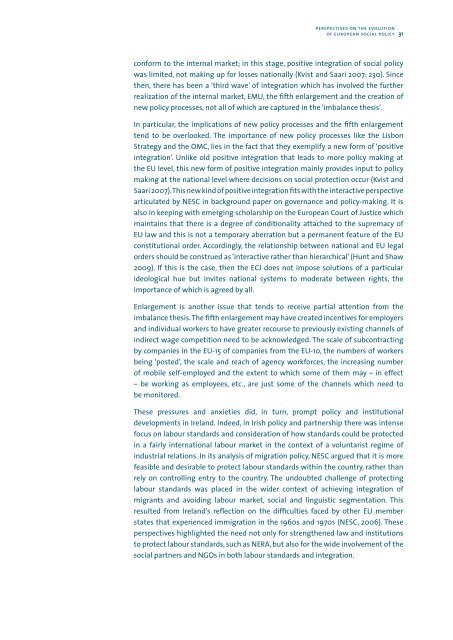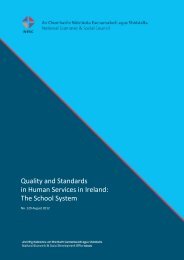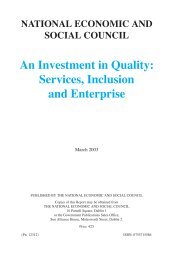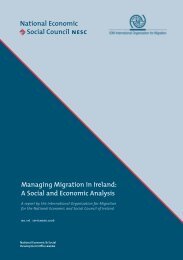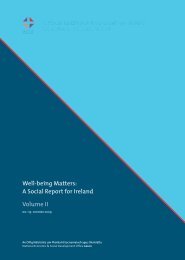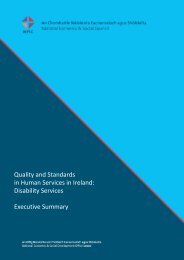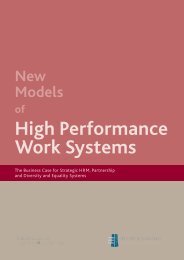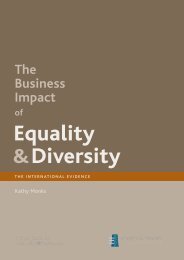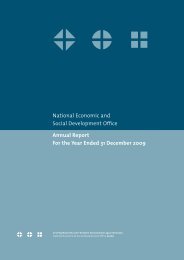4. Perspectives on the Evolution of European Social Policy
4. Perspectives on the Evolution of European Social Policy
4. Perspectives on the Evolution of European Social Policy
- No tags were found...
You also want an ePaper? Increase the reach of your titles
YUMPU automatically turns print PDFs into web optimized ePapers that Google loves.
perspectives <strong>on</strong> <strong>the</strong> evoluti<strong>on</strong><strong>of</strong> european social policy 31c<strong>on</strong>form to <strong>the</strong> internal market; in this stage, positive integrati<strong>on</strong> <strong>of</strong> social policywas limited, not making up for losses nati<strong>on</strong>ally (Kvist and Saari 2007: 230). Since<strong>the</strong>n, <strong>the</strong>re has been a ‘third wave’ <strong>of</strong> integrati<strong>on</strong> which has involved <strong>the</strong> fur<strong>the</strong>rrealizati<strong>on</strong> <strong>of</strong> <strong>the</strong> internal market, EMU, <strong>the</strong> fifth enlargement and <strong>the</strong> creati<strong>on</strong> <strong>of</strong>new policy processes, not all <strong>of</strong> which are captured in <strong>the</strong> ‘imbalance <strong>the</strong>sis’.In particular, <strong>the</strong> implicati<strong>on</strong>s <strong>of</strong> new policy processes and <strong>the</strong> fifth enlargementtend to be overlooked. The importance <strong>of</strong> new policy processes like <strong>the</strong> Lisb<strong>on</strong>Strategy and <strong>the</strong> OMC, lies in <strong>the</strong> fact that <strong>the</strong>y exemplify a new form <strong>of</strong> ‘positiveintegrati<strong>on</strong>’. Unlike old positive integrati<strong>on</strong> that leads to more policy making at<strong>the</strong> EU level, this new form <strong>of</strong> positive integrati<strong>on</strong> mainly provides input to policymaking at <strong>the</strong> nati<strong>on</strong>al level where decisi<strong>on</strong>s <strong>on</strong> social protecti<strong>on</strong> occur (Kvist andSaari 2007). This new kind <strong>of</strong> positive integrati<strong>on</strong> fits with <strong>the</strong> interactive perspectivearticulated by NESC in background paper <strong>on</strong> governance and policy-making. It isalso in keeping with emerging scholarship <strong>on</strong> <strong>the</strong> <strong>European</strong> Court <strong>of</strong> Justice whichmaintains that <strong>the</strong>re is a degree <strong>of</strong> c<strong>on</strong>diti<strong>on</strong>ality attached to <strong>the</strong> supremacy <strong>of</strong>EU law and this is not a temporary aberrati<strong>on</strong> but a permanent feature <strong>of</strong> <strong>the</strong> EUc<strong>on</strong>stituti<strong>on</strong>al order. Accordingly, <strong>the</strong> relati<strong>on</strong>ship between nati<strong>on</strong>al and EU legalorders should be c<strong>on</strong>strued as ‘interactive ra<strong>the</strong>r than hierarchical’ (Hunt and Shaw2009). If this is <strong>the</strong> case, <strong>the</strong>n <strong>the</strong> ECJ does not impose soluti<strong>on</strong>s <strong>of</strong> a particularideological hue but invites nati<strong>on</strong>al systems to moderate between rights, <strong>the</strong>importance <strong>of</strong> which is agreed by all.Enlargement is ano<strong>the</strong>r issue that tends to receive partial attenti<strong>on</strong> from <strong>the</strong>imbalance <strong>the</strong>sis. The fifth enlargement may have created incentives for employersand individual workers to have greater recourse to previously existing channels <strong>of</strong>indirect wage competiti<strong>on</strong> need to be acknowledged. The scale <strong>of</strong> subc<strong>on</strong>tractingby companies in <strong>the</strong> EU-15 <strong>of</strong> companies from <strong>the</strong> EU-10, <strong>the</strong> numbers <strong>of</strong> workersbeing ‘posted’, <strong>the</strong> scale and reach <strong>of</strong> agency workforces, <strong>the</strong> increasing number<strong>of</strong> mobile self-employed and <strong>the</strong> extent to which some <strong>of</strong> <strong>the</strong>m may – in effect– be working as employees, etc., are just some <strong>of</strong> <strong>the</strong> channels which need tobe m<strong>on</strong>itored.These pressures and anxieties did, in turn, prompt policy and instituti<strong>on</strong>aldevelopments in Ireland. Indeed, in Irish policy and partnership <strong>the</strong>re was intensefocus <strong>on</strong> labour standards and c<strong>on</strong>siderati<strong>on</strong> <strong>of</strong> how standards could be protectedin a fairly internati<strong>on</strong>al labour market in <strong>the</strong> c<strong>on</strong>text <strong>of</strong> a voluntarist regime <strong>of</strong>industrial relati<strong>on</strong>s. In its analysis <strong>of</strong> migrati<strong>on</strong> policy, NESC argued that it is morefeasible and desirable to protect labour standards within <strong>the</strong> country, ra<strong>the</strong>r thanrely <strong>on</strong> c<strong>on</strong>trolling entry to <strong>the</strong> country. The undoubted challenge <strong>of</strong> protectinglabour standards was placed in <strong>the</strong> wider c<strong>on</strong>text <strong>of</strong> achieving integrati<strong>on</strong> <strong>of</strong>migrants and avoiding labour market, social and linguistic segmentati<strong>on</strong>. Thisresulted from Ireland’s reflecti<strong>on</strong> <strong>on</strong> <strong>the</strong> difficulties faced by o<strong>the</strong>r EU memberstates that experienced immigrati<strong>on</strong> in <strong>the</strong> 1960s and 1970s (NESC, 2006). Theseperspectives highlighted <strong>the</strong> need not <strong>on</strong>ly for streng<strong>the</strong>ned law and instituti<strong>on</strong>sto protect labour standards, such as NERA, but also for <strong>the</strong> wide involvement <strong>of</strong> <strong>the</strong>social partners and NGOs in both labour standards and integrati<strong>on</strong>.


